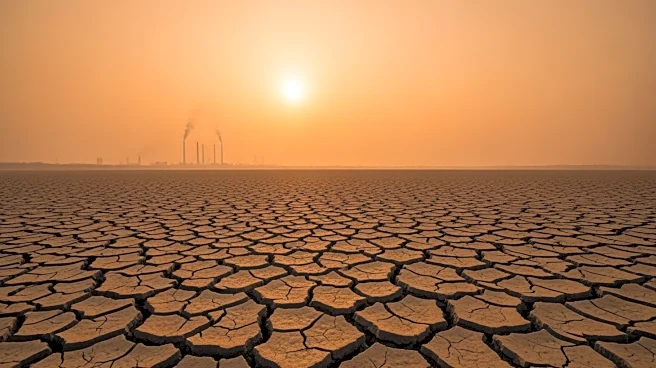What's Happening?
At the United Nations climate negotiations in Belem, Brazil, scientists reported a 1.1% increase in emissions from fossil fuels for the second consecutive year. This rise, although small, continues to
challenge efforts to curb global warming. The Global Carbon Project, which calculates yearly emissions, highlighted the relentless nature of carbon emissions. A separate report by Climate Action Tracker indicated that recent climate efforts have not significantly altered projections for future warming. The report noted that actions by President Trump's administration have contributed to increased warming projections. The world is currently on track for a 2.6 degrees Celsius increase in temperature above mid-1800s levels, slightly lower than last year's projections but still far from the 1.5 degrees Celsius target set by the Paris Agreement.
Why It's Important?
The continued rise in fossil fuel emissions poses a significant threat to global climate goals, particularly the target set by the Paris Agreement to limit warming to 1.5 degrees Celsius. The increase in emissions could lead to severe environmental consequences, including more frequent and intense weather events, rising sea levels, and disruptions to ecosystems. The report's findings underscore the need for stronger political momentum and policy changes to address climate change effectively. The impact of President Trump's policies on climate projections highlights the influence of U.S. policy decisions on global climate efforts. The situation calls for urgent action from governments worldwide to implement more aggressive measures to reduce emissions and transition to sustainable energy sources.
What's Next?
The COP30 conference in Belem, Brazil, serves as a platform for negotiators to discuss strategies to halt the rise in emissions and achieve significant reductions. Countries are expected to review and potentially revise their climate-fighting plans to align with global targets. The conference may lead to new commitments and collaborations aimed at accelerating the transition to renewable energy and enhancing carbon reduction efforts. Stakeholders, including governments, environmental organizations, and the private sector, will likely face increased pressure to demonstrate tangible progress in reducing emissions. The outcome of the conference could influence future international climate policies and agreements.
Beyond the Headlines
The persistent rise in emissions despite global efforts highlights the complexity of addressing climate change. It raises ethical questions about the responsibility of developed nations, which historically have contributed more to emissions, to lead the way in climate action. The situation also emphasizes the need for technological innovation and investment in clean energy solutions. Long-term shifts in energy production and consumption patterns are essential to achieving climate goals. The role of public awareness and advocacy in driving policy changes and holding governments accountable is increasingly important.










